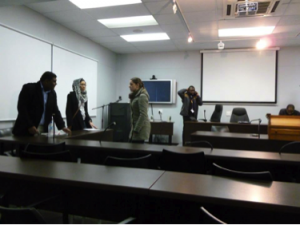Ubuntu scholarship and South Africa calls! (Part 1) – Christina Hyatali
“Giving is a universal opportunity. Regardless of your age, profession, religion, income bracket, and background, you have the capacity to create change.”
Laura Arrillaga-‐Andreessen – Philanthropist
Pro bono activity has always been an important part of my experience in completing my law degree. As an LPC student in City Law school I had undertaken various pro bono activities including working in City University’s student advice center and City Law school’s own legal clinic. In July of this year I was awarded the Ubuntu scholarship from the City Law School, this allowed students from the LPC and BPTC courses to work in the legal advice clinic of the University of the Western Cape (UWC) in South Africa as legal interns for one month. As an aspiring solicitor I felt that this was a chance for me to not only see how the law functioned in the context of a different country and with people who had very real and different problems, but to further build on the skills that I had learned on the LPC course at City.
The Legal Clinic at the University of the Western Cape is a public interest law clinic that provides free legal services to vulnerable and indignant communities in Cape Town. The clinic mainly specialises in Civil matters with the corporation of Legal Aid South Africa and also has a very active street law program which is run by the legal students.
Throughout the course of this blog, I will aim to provide an overview of my daily work with the law clinic as well as any special activities and specific trips that are undertaken with UWC’s street law group as well as some insight into the research tasks and functioning of Legal Aid in Cape Town South Africa.
Daily Tasks in the UWC Legal Aid Clinic
As part of my daily tasks in the Legal Aid Clinic I would sit in on the client consultations with the legal students at UWC. The clinic would see a large number of clients every day in either the morning or afternoon sessions. These clients came from the poorer communities and townships around Cape Town and their problems ranged over a variety of legal issues including divorce, eviction and simple contractual disputes, however the clinic mainly dealt with civil cases.
In order to qualify for legal aid in South Africa you have to earn below the minimum threshold of five thousand rand. Usually a means test would be undertaken to determine how much Legal Aid is to be given for different households. Over the month I observed many different client consultations. These consultations could be in one of three languages, English, Afrikaans or Xhosa and while some were referred elsewhere, the most notable case I observed was a woman who came in seeking a Divorce from her Husband. She had previously been in court two times for assault on account of her husband and after managing to make herself financially independent from him, was seeking to have him completely out of her life. She met all of the criteria for a divorce seamlessly and I was able to see how beneficial the legal aid system in South Africa was for the less fortunate people who wanted basic legal help and could not get it otherwise.
Further to the client consultations, I undertook various research and administrative tasks for the clinic director Mr. Shamiel Jassiem. The main focus points of these research tasks were based in Human Rights Law. The first task that we undertook was to put together a slide show for a paper written by Mr. Jassiem on the victims of Rape being forced to marry their rapists. This was a highly interesting task as it was a topic I did not know much about myself. My work was later used as part of a presentation to all the senior staff who part of the law faculty in UWC.

As an additional research task, I was asked to look at the importance of having a secondary bank or “trust” account as it is called in South Africa for client money in the legal clinics. This was in support of another paper being written by Mr. Jassiem and another lecturer in the Legal Faculty, Mr. Abraham Hamman on the implications of the new legal practice bill in South Africa. Mr. Jassiem and his colleague are arguing that a second bank account for legal aid clinics is not necessary as there is not any substantial client money retained by the clinics when handling a matter. While I will not be here to see the result of this paper, it is gratifying to know that my research would be used in writing such an important paper on behalf of the legal clinics in South Africa.
Finally I was also able to assist some of the students in the legal clinic with their preparation for the Child Law moot that was to be held in Pretoria in September. While I did not have specific experience with mooting having taken part in the Worshipful Company of Arbitrators mediation competition this year I was able to help the students with oral presentation and body language. I found this to be an interesting opportunity as I was able to use my own experience to help the students and I was able to see them improve as I observed them in various mock moots through out my final week at the clinic.
Christina Hyatali, a native of the islands of Trinidad and Tobago in the Caribbean has an LLB in English and Spanish law from the University of Kent in Canterbury. She recently completed the LPC in the City Law School. She has particular interest in the areas of family law and commercial dispute resolution. She is currently pursuing her legal training in Trinidad.
Look out for Part Two of Christina’s account next week…

